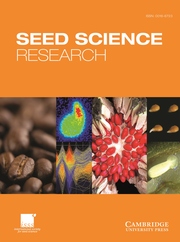Article contents
Molecular and physiological markers during seed development of peppers (Capsicum annuum L.): DNA replication and β-tubulin synthesis
Published online by Cambridge University Press: 22 February 2007
Abstract
The correlation between physiological markers for seed maturity (acquisition of germinability, definitive morphological traits and desiccation tolerance) and timing of the shutdown of nuclear replication activity and β-tubulin synthesis has been investigated in developing pepper seeds. Nuclear replication activity was analysed by flow cytometry. Expression of β-tubulin, a cell-cycle related structural protein, was detected in western blots of total protein extracts. In pepper embryos, DNA synthesis stopped 42–49 days after anthesis (DAA), at which time seeds started to acquire desiccation tolerance. A clear β-tubulin signal was detected up to 63 DAA, only 1 week before the acquisition of complete desiccation tolerance. Both nuclear replication and β-tubulin synthesis can therefore be used as markers for the physiological stage reached by developing pepper seeds. Detection of β-tubulin signals in embryonic tissues can also be helpful in discriminating immature seeds within a commercial seed lot.
Information
- Type
- Research Article
- Information
- Copyright
- Copyright © Cambridge University Press 1999
References
- 6
- Cited by

